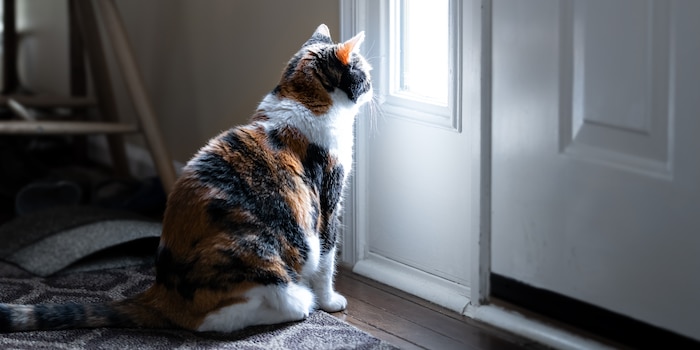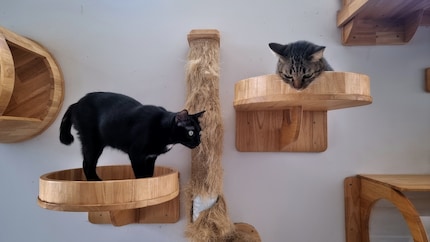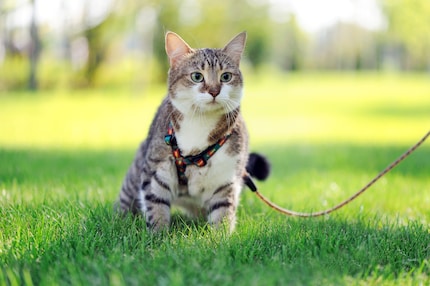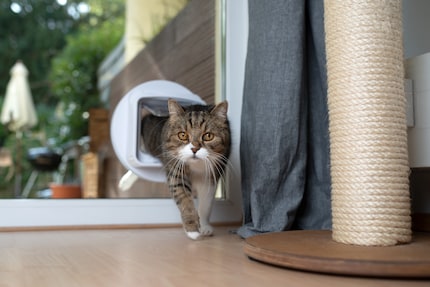
Guide
One of your housecats dies: here’s why you should get them a new companion
by Darina Schweizer

Cat owners often disagree on the most animal-friendly way to keep their furry friends. Should every feline be free to roam? Or are some kitties simply better off indoors? In this fifth instalment of Paw + Order, you’ll find out what your cat really needs to feel comfortable, be it indoors or outdoors.
My childhood cats were always roaming between houses, so I’m suspicious of purely indoor cats. To be honest, I actually feel a bit sorry for them. The fact that I live in a rooftop flat with no balcony is one of numerous reasons why I’ve refrained from buying a four-legged friend.
Recently, however, I visited someone who’d created a genuine paradise for his house cats. Cat trees, shelves, hiding places and things for the kitties to climb on literally had me feeling like the cat had got my tongue. Could my new apartment with two balconies be a suitable home for house cats? Time to ask Caroline Mulle, a legal research associate at animal welfare legal charity «Stiftung für das Tier im Recht».
Caroline Mulle, is it animal-friendly to keep cats indoors?
Animal welfare legislation allows this in principle. Cats are very adaptable. Even without the opportunity to run around in the open air, they can be very happy. However, this is only okay from an animal welfare point of view if they’ve lived in an apartment from a young age and therefore never develop an attachment to the outside world. Since an indoor habitat is much less varied than that of an outdoor cat, house cats can’t do the things cats do most – hunting and observing. As a result of that, they need to compensate by doing other things.
What should you be aware of when it comes to creating an indoor environment suitable for cats?
Article 80 of the Animal Protection Act stipulates that domestic cats should have places to hide away and things to keep them occupied. These include objects to scratch and climb as well as raised areas for the cats to rest on. Each animal is also required to have its own litter box. If cats are to be cared for in a species-appropriate way, they need to be given enough activity. You can do this by giving them various toys or things they can scratch. Cats also need to be given the opportunity to meet their need for social contact.

What does that involve?
Ideally, house cats should have a second cat to interact with as a species-appropriate cuddle partner and playmate.
Is having a second cat absolutely necessary? Or does a human count as a substitute?
The Animal Protection Act also considers humans to be adequate social partners for cats – at least in theory. However, lone cats need daily contact with humans or visual contact with other cats. That being said, the cat’s personality is also a factor here.
What do you mean?
Not every cat is receptive to social contact with other animals. There are also antisocial loners and sick or old animals that’d be stressed by a second cat. Getting enough social contact from humans in the form of activity and cuddles is all the more important when that’s the case.
How big does your apartment need to be to have a house cat?
The rule of thumb is that there should be at least one room per cat. Ideally, they should have access to every room in order to give them as much variety as possible. Cats also love lying on elevated surfaces and observing their surroundings. The window’s good, too, because it allows them to look outside. Giving your pet access to cupboards, bookcases and securely mounted wall shelves provides them with even more living space. Sleeping dens and other hiding spots are also welcome additions.
And what do you think of cat leads?
Generally speaking, we should be sceptical of cat leads. Cats are very independent, freedom-loving animals that aren’t necessarily dependent on humans. Leads prevent them from following their natural impulses and exploring their surroundings at their own pace. For a territorial animal, constantly being in new environments sometimes means additional stress too. Putting on and wearing these leashes can also be distressing for a cat. That being said, there may well be situations where it makes sense to use a lead.

What might those be?
As a precaution if you’ve just moved house and your cat’s going out for the first time in the new place. However, even in that kind of situation, the cat’s needs should always come first. Catios (secure outdoor enclosures you can put in your garden) are better alternatives to cat leads. Or, to mention a more well-established example, you can get a cat net. These allow house cats to go out for a little fresh air, say, on a balcony.
Are there cats that you explicitly recommend keeping indoors?
Yes. A cat might have an impairment that means it’s simply too dangerous for them to go outside. Or they could have a highly contagious disease such as Feline Infectious Peritonitis, or FIP for short. In such cases, it’s actually advisable to keep your pet indoors.
Can an indoor cat become an outdoor cat and vice versa?
Once a cat’s had the freedom to roam in the wild, they’re often no longer satisfied with being kept indoors all the time. When this happens, behavioural problems such as poor hygiene or aggression are inevitable. However, cats that have only ever been kept indoors are sometimes more than capable of getting their bearings outside. These cats should be introduced to the outside world step by step, always accompanied by their owner during their first outings.

What do you need to think about before letting your cat out?
Cats should be chipped, vaccinated and neutered before being allowed outside for the first time. You should also make sure there are no immediate dangers nearby, such as a busy road. Similarly, you should keep cats indoors when fields in the surrounding area are being reaped. Unfortunately, a growing number of cats are being killed by combine harvesters.
What about going out at night?
Your cats should come home at night and at dawn because that’s when accidents are most likely to happen. To make sure they return in time, it’s worth training them to respond to your call. This works best if you reward your cat for coming back, be it with food, play or cuddles.
Do you let your feline friend outside? Do you have a cat in your apartment? How do you make sure your kitties are well cared for? Let me know in the comments.
I love anything with four legs or roots - especially my shelter cats Jasper and Joy and my collection of succulents. My favourite things to do are stalking around with police dogs and cat coiffeurs on reportages or letting sensitive stories flourish in garden brockis and Japanese gardens.
Practical solutions for everyday problems with technology, household hacks and much more.
Show all